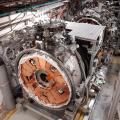High Energy Physics and Experimental Techniques
Development Strategy for POB High Energy Physics and Experimental Techniques for years 2022-2026
The catalog with cooperation proposal>>>
Exemplary activities:
A summary of three years of the activity of POB High Energy Physics and Experimental Techniques
Published: 10/07/2023
Major events
ALICE experiment: progress in research
Published: 08/10/2021
Scientists from the Faculty of Physics have published in the journal Physics Letters B the latest results of their research on changes in the characteristics of the strong interaction between ordinary matter and strange matter change.
Consolidation of WUT leadership of the antiprotonic atoms program at AEgIS experiment at CERN
Published: 22/09/2021
The international collaboration of the AEgIS experiment at CERN has nominated dr Georgy Kornakov, assistant professor of the Physics Faculty of PW, on 14/9/2021 for the Convenership for Physics with Antiprotonic Atoms. This position will be shared with Dr Giovanni Cerchiari from the University of Innsbruck. This nomination strengthens the leadership position of the PW team within the AEgIS experiment.
The NA61/SHINE experiment – the success of Polish scientists in an international project
Published: 09/03/2021
The physics of heavy ion collisions is a field that aims at learning about the character of the strong force. Since it is impossible to isolate a single colour particle, describing a phase diagram of strong interactions of matter has become a priority. A single experimental measurement is not sufficient to define such a structure. Hence, it is necessary to conduct various analyses in many fields in which each field provides a part of the answer. WUT researchers are making a great contribution to the conducted research.
Research on heavy ion collisions – a step towards understanding the evolution of the early universe
Published: 22/01/2021
As part of the implementation of a research grant awarded in FWEiTE-1 competition, a team from the Faculty of Physics at the Warsaw University of Technology has undertaken research on the geometry and dynamics of heavy ion collisions utilising the correlation femtoscopy method, in close cooperation with scientists all over the world within STAR (RHIC), HADES (SIS-18) and CBM (SIS-100) experiments. In their work, researchers place special emphasis on the analysis of a phase diagram of quantum chromodynamics (QCD) in an area which still remains unexplored, i.e. heavy ion collisions, in so far untested range of collision energies amounting to a few or a few dozen giga electron volts (GeV).
ALICE collaboration opens avenue for high-precision studies of the strong force
Published: 10/12/2020
The international the ALICE experiment at the Large Hadron Collider has published conclusions from the results of its research in the prestigious scientific journal “Nature”. Among the people involved in this project are also scientists related to PR High Energy Physics and Experimental Techniques.
WUT joins world efforts to unravel the mysteries of antimatter with the AEgIS experiment at CERN
Published: 16/11/2020
The AEgIS experiment (Antihydrogen Experiment: Gravity, Interferometry, Spectroscopy) aims to measure the gravitational fall of an antihydrogen pulsed beam. At the end of October WUT Rector signed the Memorandum of Understanding with CERN allowing WUT to become a full member of the AEgIS Collaboration. The project is supported by Priority Research High Energy Physics and Experimental Techniques (PR HEP).






